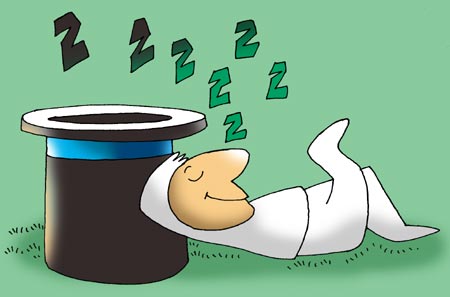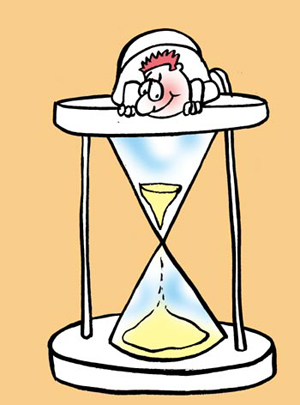Supriya Thanawala
IIT Delhi student Shiny Singh tells us what you need to do during those crucial few hours before you get set to write the IIT JEE exam that will be held on April 10, 2011.
The most coveted entrance exam of the year -- the IIT JEE -- is just around the corner. So we understand it is natural to be a bundle of nerves, but what is it that you should do right now, less than 48 hours away from the D-Day?
19-year old Shiny Singh, who is doing her Electric Engineering at IIT Delhi, shares some insights with us about what it was like for her to crack the competitive IIT's national-level Joint Entrance Exam 2010, last year, and what one can do at the last minute.
Illustrations: Uttam Ghosh
This is not the time to pick up any new topics
Image: Say NO to starting new topics at this stageGo through as many mock test papers as you possibly can and revise what you already know.
The best thing to do at this stage is to get a broad overview of the entire material, and perhaps just clear a few doubts in other areas. Give an extra hour for subjects that you find difficult.
Give mathematics a rest. Mathematics is too wide, and there's nothing you can change about what you already know at this stage.
So a general quick glance over the entire thing is sufficient.
Relax and have fun!
Image: Sit back and relaxI got very tensed before my test last year, but that's the last thing I would advise others to do.
I wasn't relaxed at all and panicked considerably. I also spent time with friends, because of whom the tension grew considerably.
Avoid company where you tend to talk about the test and worry about what you have not done.
I'd instead suggest going out and have fun with family or others who aren't going to work you up and let you just chill, so that your mind is fresh before the exam.
Basically, don't ponder over the topics that you have not covered. Focus on the stuff that you already know well.
Manage your time well during the test
Image: It is crucial how you can manage your timeI felt that the time was short. But then again, most people don't finish their papers on time.
The only way to tackle this is to attempt the questions and subjects first that you know well. I'd recommend attempting mathematics at the end because it is the most time consuming.
Chemistry on the other hand is the least time-consuming, because it's stuff that you will remember and know. It will not take you more than 45 minutes to complete the Chemistry section, so I suggest you start with that. Move on to Physics and then to Mathematics.
If you get stuck somewhere, like say in Mathematics, leave the question. Don't waste time over a question that you cannot attempt quickly and then move on.
Also, don't ever depend on getting the chance to go back to a question.
It's often worth simply taking an extra minute to evaluate the question and looking at whether you can solve it.
If you can't and decide to go on to the next question, then move on for good, and don't come try to come back to it later.
You'll only waste time doing that; there is absolutely no time to come back to anything unsolved or unattempted.
At the end of the day, speed is something you cannot develop right now, or at the last minute. It comes with a year's practice.
You must have all your concepts clear, and you must have done a lot of practice throughout the time. That's the only way you can build speed and accuracy.
Be prepared for changing patterns in the exam every year.
The formats in no two consecutive test papers are the same. Sometimes there are a lot of sections where there is negative marking; sometimes there are none. If there's no negative marking for a question, make sure you attempt it. The key is to focus on accuracy.





Comment
article